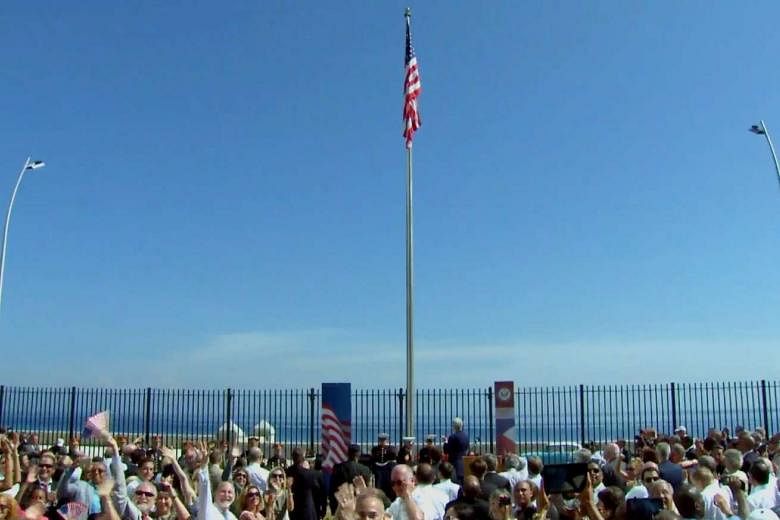HAVANA (AFP) - Secretary of State John Kerry called Friday for "genuine democracy" in Cuba as the American flag was raised over a US embassy in Havana for the first time in 54 years.
Putting a symbolic capstone on the United States' historic rapprochement with Cuba, Kerry gave the cue to hoist the Stars and Stripes over the glass-and-concrete building on the Havana waterfront.
Three retired Marines who lowered the flag on Jan 4, 1961 - as Washington severed ties with Havana at the height of the Cold War - were on hand to give the new flag to the Marine guard now charged with security at the embassy.
The symbolic moment served as a picture-perfect coda to eight months of quick changes since the Dec 17 announcement of the restoration of ties by US President Barack Obama and Cuban counterpart Raul Castro, paving the way for the two countries to reopen their embassies on July 20.
Kerry, the first secretary of state to visit Cuba since 1945, said the shift in US policy did not mean Washington would stop pressing for change on the communist island.
"The leaders in Havana and the Cuban people should also know that the United States will always remain a champion of democratic principles and reforms," he said, in a speech delivered partly in Spanish.
"We remain convinced the people of Cuba would be best served by a genuine democracy where people are free to choose their leaders."
The thawing in the Cold War conflict has been criticised by Obama's conservative opponents.
Kerry's visit drew barbed comments from leading Republicans, including 2016 presidential contenders Marco Rubio and Jeb Bush.
Rubio, a Cuban-American senator from Florida, slammed the Obama administration for the absence of Cuban dissidents from the flag-raising ceremony.
"All the people in Cuba fighting for democracy, when they protest, they are rounded up, arrested and beaten. None of them were invited to this event," he told Fox News.
Cuban Foreign Minister Bruno Rodriguez said the country was ready to discuss any issue with the United States, including human rights - "though we may not always agree," he added, speaking alongside Kerry at a joint press conference.
In eight months of negotiations since the rapprochement was announced, the two sides have made progress on a number of divisive issues, most notably the removal of Cuba from Washington's list of "state sponsors of terrorism."
But Rodriguez warned that Cuba still has tough demands on the table as the two sides continue talks.
They include the full lifting of the "blockade" - or economic embargo - that the US has maintained on Cuba since 1962 and the return of the "usurped" Cuban territory of the American navy base at Guantanamo Bay, he said.
WARY DISSIDENTS
Kerry was due to meet privately later with Cuban dissidents, who long counted Washington as their main ally and have voiced concern the new thaw will leave them out in the cold.
Berta Soler, the leader of the Ladies in White - one of the most high-profile dissident groups - said she had no plans to attend the event.
"It's a low-profile reception with speeches and that kind of thing. We can't waste our time on that," she told AFP.
Kerry also took a stroll through Old Havana, with an eye on meeting ordinary Cubans in the historic colonial district.
He will not, however, meet with either Castro or his elder brother Fidel, the icon who led Cuba from its 1959 revolution until his retirement in 2006.
Underlining the sticking points still complicating relations, Fidel Castro said in an essay published in Cuban state media Thursday - his 89th birthday - that the United States owes Cuba "many millions of dollars" because of the trade embargo.
Cuba says the embargo has cost it US$116 billion.
The United States for its part says Cuba owes US$7 billion to American citizens and companies whose property was seized after Castro came to power.
Kerry reiterated that the Obama administration "strongly favours" lifting the embargo.
But Obama faces an uphill battle as he needs approval from Congress, where both houses are currently controlled by his Republican opponents - many of them deeply hostile to Havana.

